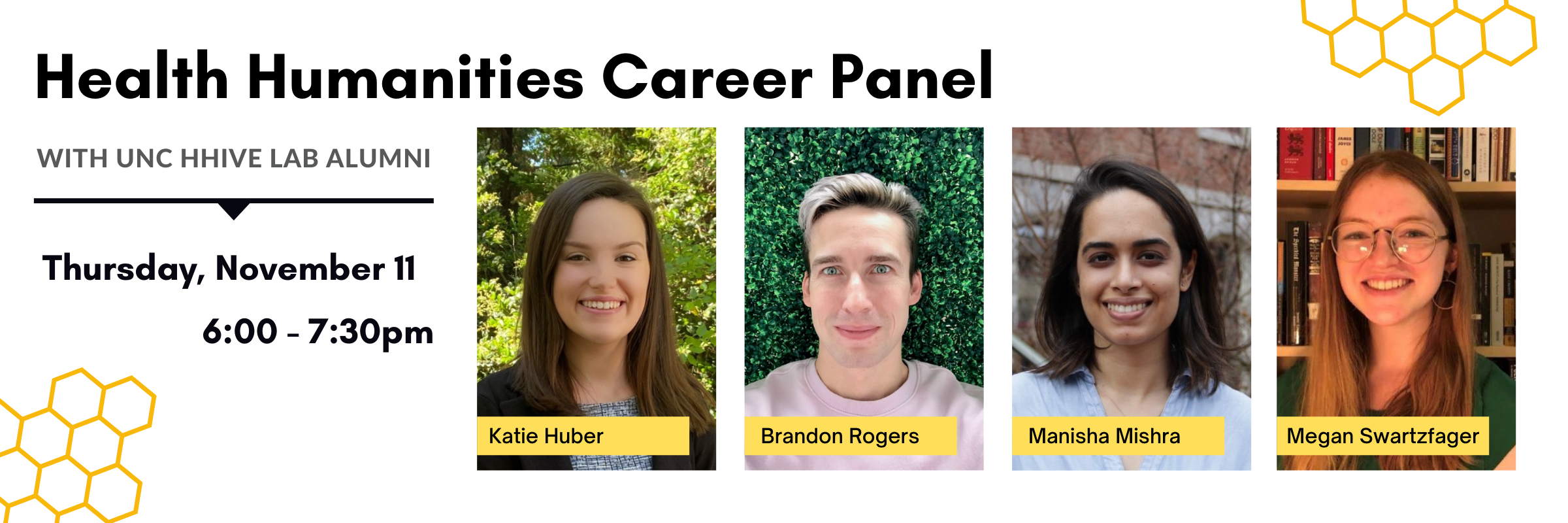Here at the HHIVE Lab, we recognize and emphasize the importance of a humanitarian approach to healthcare. Through every project we tackle, we seek to promote critical thinking skills, cultural humility, historical competence, and an overall interdisciplinary spirit. Though the benefits on a broader, interpersonal level are clear, the concrete advantages of a health humanities education in the professional field may not appear as black and white to many.
On November 11, 2021 four former HHIVE Lab students set the record straight about how their humanities backgrounds provided them with tangible, valuable skills and knowledge that help them thrive in their respective careers. Katie Huber, a class of 2018 HHIVE alum, is a policy analyst at the Duke Margolis Center for Health Policy. Here, she is currently working with state health officials to improve COVID-19 vaccination efforts nationwide. Manisha Mishra, another 2018 HHIVE alum and the founder of UNC’s Health Humanities Journal, is an NYU clinical research coordinator in the field of addiction medicine at Bellevue Hospital (one of the oldest and largest public hospitals in the country). Brandon Rogers was one of UNC’s first graduates from the Literature, Medicine, and Culture (LMC) Master’s program and is currently finishing his PhD in Communication, Rhetoric and Digital Media at North Carolina State University. He is a health communications specialist with Americares, a nonprofit that is working with hundreds of clinics worldwide to instill COVID-19 vaccine confidence in healthcare professionals. The final panelist, Megan Swartzfager, is a 2021 graduate of the LMC Master’s program and former Grand Rounds coordinator for the HHIVE Lab. She secured the title of medical editor at the Los Angeles Department of Health immediately upon graduation.
Throughout the ninety-minute virtual session, each of the four panelists touched on how their health humanities backgrounds gave them the communication skills necessary to excel in their lines of work. As a member of the HHIVE Lab, Manisha devoted her time to researching clinical empathy with Dr. Jane Thrailkill. Today, she puts this experience to use in patient interactions on a daily basis. She explained how she acts as a “linkage between clinical care and social work,” spending most of her time with the homeless and uninsured individuals who enter Bellevue’s ER. Brandon, on the other hand, uses his communication skills in discussions with stakeholders, state associations, and even fellow specialists. He thanks his health humanities background for providing him with the knowledge and flexibility necessary to flourish in his professional interactions.
Equally as important as oral communication is written communication. Across each of their individual stories, one theme was made abundantly clear—writing is an essential skill in a wide array of health careers. Both Megan and Manisha’s jobs task them with writing for the general public. To do so successfully, they have to adapt to a more concise, simple writing style that can be understood by all target audiences. Katie puts her rhetorical muscles to work crafting policy briefs for state health officials, where she must write both succinctly and argumentatively. Brandon’s work requires him to write in numerous different genres, from CDC website pages and video scripts to banner ads and infographics. Though each of their jobs may require different genres, they all credit their success and flexibility in writing to their humanities backgrounds. In fact, Brandon’s biggest piece of advice was to take a creative writing class: although it is “very different from scientific writing,” he explains, the narrative skills these classes teach can be very beneficial in numerous writing forms spanning many career types.
Overall, each of the panelists was grateful for the interdisciplinary nature of their health humanities educations. Although Brandon’s line of work is not directly associated with the health humanities, he explained how HHIVE taught him the importance of considering the historical context of health issues, a technique that he claims has supported his work greatly. For Manisha, HHIVE was one of her first experiences with research outside of a traditional laboratory setting. She utilizes the qualitative interviewing skills that she picked up from HHIVE in her research today. Initially a pre-med student, Katie’s HHIVE Lab experiences taught her to open her mind to other fields; this led her to health policy, where she continues to foster the qualitative research and empathy skills that she learned through the health humanities. Megan values the humanities for its flexibility, adaptability, and most of all, its core spirit of generosity: “assuming a higher level of knowledge than the public and being willing to share your tools with them is something that others in the health field without humanities backgrounds may not be inclined to do.”
Baylee Materia is an undergraduate at UNC studying Neuroscience and Pre-Med. When she made the decision to enter college as a STEM major, she assumed that she would have to toss her love of humanities aside. Discovering the HHIVE lab taught her not only that she can merge these seemingly contrasting passions of hers, but that an interdisciplinary approach is essential in a pre-medical curriculum. The job of a physician goes beyond the concrete science and technical intellect; one must be emotionally intelligent and able to understand the complex socioeconomic and cultural determinants of health. With a background in the health humanities, Baylee hopes to become a member of a new generation of healthcare professionals that approaches their work with a more nuanced and compassionate perspective.



